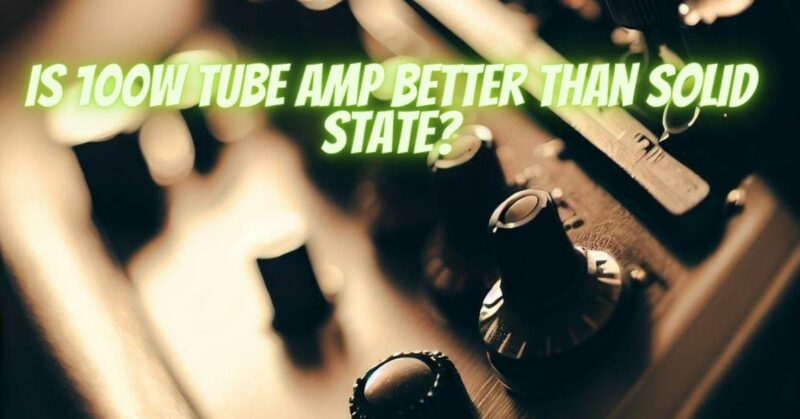The debate over the superiority of a 100-watt tube amp compared to its solid-state counterpart is a topic that often sparks discussions among musicians and audio enthusiasts. The choice between tube and solid-state amplifiers depends on various factors, and wattage is just one piece of the puzzle. In this article, we’ll explore the considerations that come into play when evaluating the merits of a 100-watt tube amp versus a solid-state amplifier.
Understanding Tube and Solid-State Amplifiers
100-Watt Tube Amps: A 100-watt tube amp is known for its significant power output, capable of delivering high volume levels suitable for large venues and outdoor performances. Tube amps are cherished for their harmonic richness, warm saturation, and dynamic response, contributing to a vintage and classic sound.
Solid-State Amplifiers: Solid-state amplifiers offer a wide range of wattages, including 100-watt models. They are known for their efficiency, accurate sound reproduction, and durability. Modern solid-state technology has improved their sound quality and tonal versatility.
Tonal Characteristics and Sound
Tube Amps: Tube amps are often favored for their unique tonal characteristics, including harmonic distortion and overdrive. The warm and rich sound that tubes produce is appealing to musicians seeking a vintage, expressive, and dynamic sound. The saturation and compression that occur when pushing a 100-watt tube amp can result in a pleasing and musical distortion.
Solid-State Amps: While early solid-state amplifiers were criticized for their sterile sound, modern advancements have led to significant improvements in sound quality. High-wattage solid-state amps can produce clean and accurate sound with minimal distortion, making them suitable for a wide range of musical genres.
Performance Context
Live Performances: A 100-watt tube amp can be an asset for live performances, especially in larger venues and outdoor settings. The harmonic richness and dynamic response of tubes can help the sound cut through the mix and create an engaging sonic experience.
Recording and Studio Use: When it comes to studio recording or situations where controlled sound is essential, both tube and solid-state amplifiers have their merits. A 100-watt tube amp can deliver the desired tonal qualities, while a high-wattage solid-state amp can offer clean and accurate sound without the inherent distortion of tubes.
Portability and Weight
Tube Amps: Generally, tube amps tend to be heavier due to the components and circuitry involved. A 100-watt tube amp can be quite heavy and might require additional considerations for transportation.
Solid-State Amps: Solid-state amplifiers are often more lightweight and portable compared to their tube counterparts, making them a practical choice for musicians who need to transport their gear frequently.
Cost and Maintenance
Tube Amps: Tube amps often require more maintenance and occasional tube replacements, which can incur additional costs over time. The unique sound of tubes comes with the trade-off of ongoing maintenance.
Solid-State Amps: Solid-state amplifiers are generally more straightforward in terms of maintenance and tend to have a longer lifespan without the need for tube replacements.
The question of whether a 100-watt tube amp is better than a solid-state amplifier depends on your musical preferences, performance context, and desired tonal characteristics. Both options have their strengths and limitations, and the decision ultimately boils down to the sonic qualities you seek, the venues you play in, and your preferences for maintenance and portability. It’s advisable to try out both types of amplifiers and consider how they fit into your musical journey and specific needs before making a decision.


